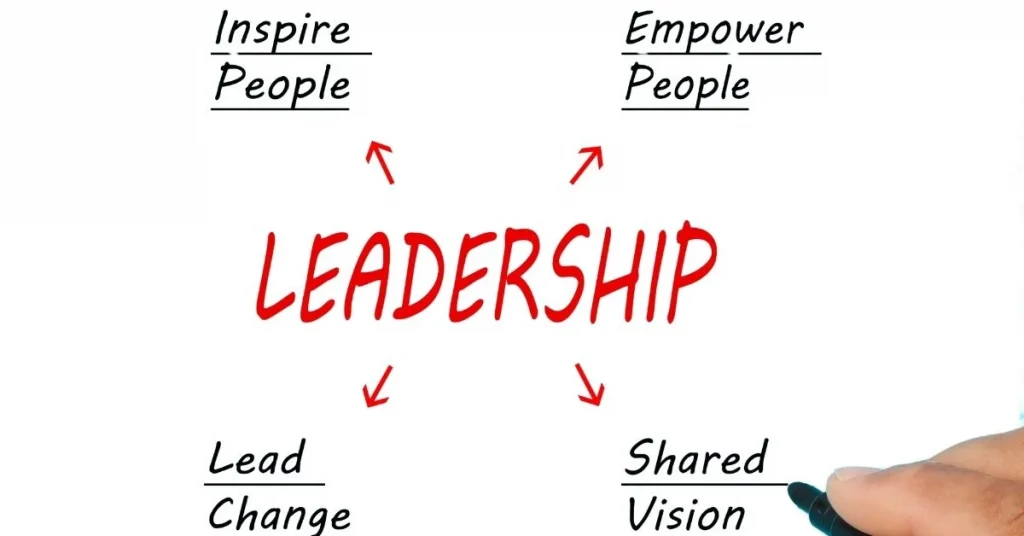Disclaimer: We sometimes use affiliate links in our content. For more information, visit our Disclaimer Page.
To be an effective leader, you must exhibit several key behaviors. This blog post will outline the ten essential management behaviors for great leaders.
We’ll also provide tips on how to develop these skills.
How to become a good manager?
Nowadays, the business world is more competitive than ever. In order to be successful, businesses need effective managers to lead them. But what does it take to be a good manager?
Many qualities make up a good manager. So let’s take a look at what you should know to become a good manager.
10 Positive Behaviours of Great Leaders
Leadership is an essential component of any organization, but knowing what makes a great leader can be challenging. Some leaders are highly visible, while others work behind the scenes. However, all great leaders share some common positive behaviours regardless of their role. Here are 10 of them.
1. Inspirational Leadership

“If your actions inspire others to dream more, learn more, do more and become more, you are a leader.”
Inspirational Leadership involves motivating employees, keeping them engaged with your product or service, and providing an environment where they are comfortable doing their best work. Essentially, inspirational Leadership requires you to be a visionary when it comes to your company’s future.
If you’re interested in developing inspiration skills, try to notice your employees’ performance and learn from their successes. Ensure that you play to your employees’ passions, but be careful not to overwhelm them with too many tasks at once!
Related: Leadership Skills
2. Strategic Thinking

“Strategic Thinking is about change, and outcomes are positive changes to a business.”
A great leader can think outside the box when solving problems and make decisions that are often right, even if they do not appear obvious. This requires practical strategic thinking skills.
To develop these skills, try looking at all sides of an argument before concluding. Look for different opinions on the same issue, and ensure that you can refute any counterarguments if necessary.
3. Emotional Intelligence

“We are dangerous when we are not conscious of our responsibility for how we behave, think, and feel.”
In a nutshell, emotional intelligence or EQ is the ability to identify and manage your own emotions and recognize, evaluate and understand the feelings of others. This skill is precious in today’s business world, where things can become very competitive.
A greater understanding of the subtleties that motivate staff members, co-workers, and even customers can promote tremendous success and growth within an organization.
Leaders with high EQ are more likely to engage, influence, and connect with those around them, improving company culture. And this is why good managers typically have high emotional intelligence, as it helps create a positive work environment where employees feel happy and fulfilled.
4. Collaborative Teamwork

“Talent wins games, but teamwork and intelligence win championships.”
Collaboration is a crucial ingredient in the success of any company, so successful leaders know how to collaborate effectively. They encourage open dialogue and ensure constructive criticism while being warm, friendly, and pleasant!
Most managers who fail to communicate well will have a much harder time managing their team members successfully since they’ll struggle to build consensus, resolve conflicts and work together in general.
To be a collaborative manager, try to take the time to understand the needs of your team members. Meet with them one-on-one, and learn what motivates them. Once you recognize what drives each person, you’ll be able to direct tasks according to individual interests and strengths whenever possible.
Related: Teamwork Makes the Dream Work Makes
5. Effective Decision Making

“Waiting hurts. Forgetting hurts. But not knowing which decision to take can sometimes be the most painful…”
Business leaders who make fast, thoughtless decisions that are not well-informed will struggle to maintain long-term success in their company. Instead, successful managers take the time to consider all factors and make an informed decision.
To avoid “panic-decision making,” it’s essential to take the time and effort to look into all sides of a problem before you land on a solution.
By taking the time to consider different options and predict the potential outcomes, you’ll be able to make faster decisions when needed without compromising accuracy.
6. Accountability

“Leaders inspire accountability through their ability to accept responsibility before they place blame.”
Successful leaders take full responsibility for everything within their department or company. If something goes wrong, they are accountable. They’re proactive about finding solutions, not just reactive.
If you’re not yet comfortable being entirely accountable for your actions, try taking baby steps to get there. Start by ensuring you always have the full facts before making a decision or reaching any conclusions. You can also try delegating tasks to don’t have to bear the full responsibility for a mistake.
7. Problem-Solving

“Great leaders are almost always great simplifiers, who can cut through argument, debate and doubt, to offer a solution everybody can understand.”
Good managers can solve problems within a work team or group and complete tasks efficiently and productively. The leader must be capable of problem-solving.
But it’s not just about coming up with solutions – instead, great leaders make sure to involve their employees when there are issues at hand (when necessary). Since they should be great leaders, one must possess the skills and attributes associated with strong problem-solving abilities.
A true leader can communicate their concern for employees who face problems regularly and listen carefully to what those people have to say (in an empathetic manner). At the same time, good leaders are not above offering advice or suggestions when necessary.
To be an effective leader, you need to have good critical thinking skills – meaning your ability to analyze a situation for logical fallacies, identify potential risks, and find logical outcomes. It would help if you also were forward-thinking enough to anticipate problems before they arise in the first place.
8. Performance Management

“Employees engage with employers and brands when they’re treated as humans worthy of respect.”
Great managers can also hold their employees accountable for what they need to do, not just tell them what to do.
As an effective leader, you should always be willing and ready to provide needed feedback whenever it’s appropriate. Without guidance, you can’t simply expect your staff members or other team members to reach certain milestones.
So, how do you know when to give feedback? First, tune into your staff’s moods and attitudes. You should always make sure your employees are comfortable with their work before giving them the green light.
If they seem frustrated or unhappy, try to pinpoint what could be causing these feelings so you can guide improvement.
9. Innovation & Creativity

“Creativity is a habit, and the best creativity is the result of good work habits.”
Thinking outside the box and fostering a culture of creative thought is a must for any leader – regardless of industry or workforce. Innovative ideas and creativity can come in many forms, from new products and services to an improved work environment.
Breaking boundaries to increase revenue without compromising on current values keeps businesses competitive at all times. Thinking outside the box and fostering a culture of creative thought is a must for any leader, regardless of industry or workforce.
To be a truly effective leader, you need to always stay on top of current industry trends or be open to change. Look for potential problems and determine the best way to solve them as they come up.
Related: Encourage Innovation
10. Honesty with a team member

“Integrity is telling myself the truth. And honesty is telling the truth to other people.”
Honesty is one of the most important qualities any leader can have, especially when communicating with their employees.
Leadership and honesty go hand in hand: A great manager knows what needs to be said and does so politely and respectfully. You may not always feel like you’re communicating the right message to your employees, but that’s when it’s essential to speak up.
As a great manager, you may also need to encourage honesty among your staff members, especially when problems arise in the workplace. An honest conversation with the whole team is the only way to get to the root of a problem and develop practical solutions.
Related: Charismatic Leadership
Who is a good manager?
A good manager is a significant person among the employees. He can be described as having a “fatherly” role in the business, someone the team members, respect and look up to at all times.
A successful manager takes care of his subordinates, provides them with necessary guidance along the way, and ensures everyone has what they need to achieve their jobs.
The role of good managers is crucial in any organization. Without them, the business could suffer. They know how to manage people, and they set the tone at work and provide guidance for their team members while making sure everyone stays motivated to reach goals together. As a result, they can help achieve the company’s mission much faster.
Great managers can make your team members successful in everything you do, and team members’ success can make a business successful.
What makes a bad manager?
On the other hand, bad managers don’t show interest in their team members. They might not provide or give them the necessary support they need to do their tasks, and even worse when they take credit for the work done by the employees under their supervision.
They do not know how to set priorities or manage people. They are often manipulative and sometimes lack empathy. Bad managers are unprepared for their new jobs, causing employees’ motivation problems that can bring down a whole business if no actions are taken.
Related: Become a Successful Associate Manager
Final Thoughts
There’s more than one correct answer when it comes to leadership styles! However, it would be best to remember that different teams and cultures work better with different types – although there are a lot of similarities, every team is unique.
The most critical leadership qualities and skills that should be the primary focus of every manager are respect, empathy, honesty, solid morals/values, motivation, problem-solving abilities, and accountability. These traits make for a more effective leader in any environment!
We hope you enjoyed this article about ten management behaviours that define great leaders with us as much as we enjoyed writing it. If you found these tips helpful and want to stay connected, sign up for our newsletter and event invites or follow us on social media!





